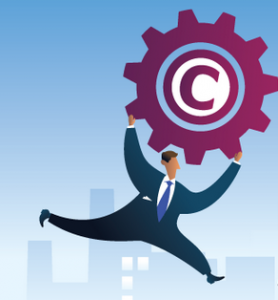The Copyright Symbol, Misunderstood: 4 Common Myths That Hurt Your Blog
 In our world of digital everything, copyright has become tricky business.
In our world of digital everything, copyright has become tricky business.
Every day we see widely adopted online practices that violate copyright.
Worse still, the Internet is full of copyright falsehoods and half truths that are mistakenly passed along, and believed to be accurate.
Misperceptions about copyright leads to copyright infringement, which hurts bloggers.
We’d like to set the record straight.
“No Copyright Symbol”? No Problem …
Let’s explore four common copyright myths, one by one:
- Copyright Myth #1 – Content without a visible copyright symbol or copyright notice is free to use.
Under the law, a work is copyrighted as soon as it’s created in fixed form.
Just because you don’t see a copyright symbol (©) or words, such as “All Rights Reserved,” doesn’t mean that the work isn’t protected by copyright. It is.
Before copying any or all, you must determine the content creator’s terms for reuse.
- Copyright Myth #2 – People are flattered when you republish their content with attribution. Asking permission is unnecessary.
While linking to someone else’s content is fine, copying is another story, even with attribution.
As flattering as you may consider it to be, not every writer is okay with your using THEIR content in service of YOUR business goals. Be courteous and ask. It’s the (copy)right thing to do.
- Copyright Myth #3 - You don’t need permission, if you’re just using a small excerpt.
Some people believe that you only have to obtain permission and provide attribution to the source if you’re taking more than a certain number of words or percentage of the original. Not true!
No matter how much or how little you “borrow,” you should ask permission and give proper attribution.
Even when you believe your reuse passes the “four-factor” test of fair use , you should still provide proper attribution or, better yet, obtain permission from the source.
After all, the creator’s notion of whether your use is a “fair” one may differ from yours. Better to be careful and up front than regretful later.
- Copyright Myth #4 – Google is a great place to get free images
Unfortunately, many people assume that the images that show up in a Google image search are free to use.
Not so! All of the images found on the Internet are copyright protected. Learn the image owner’s specific terms for reuse before using an image.
Some image creators make their images available for free reuse with attribution (for instance, Flickr Creative Commons has many images with that particular license).
There are also low-cost sources for image licensing, like bigstockphoto.com – as well as convenient WordPress plugins and tools that help you source images for your blog, website, or social use, such as Photodropper and Photopin.
The key is to do the right thing, and comply with the image creator’s terms of use, before posting an image that you find online. Don’t risk a copyright violation.
There’s more to online copyright than just this, but these four copyright mistakes are so common, we wanted to set the record straight!
What other copyright myths have you encountered? Let us know in the comments!
Bonus! Free “Blogger’s Guide to Copyright Protection”
If you’re designing, creating or writing online, and want to learn more about how to protect your content, download our free “Blogger’s Guide to Copyright Protection”.
Dr. Johnny Velazquez
Jul 14 @ 07:31:17
This is so great! I’m developing a comical character, and have posted two articles on it. Are you saying that, even though I haven’t registered it, I’m still protected? I do plan to copyright it in the near future. I will await your response. Blessings.
Rhonda Hurwitz
Jul 19 @ 05:47:18
I think your question is whether an original (comic) character you have written about publicly is protected by copyright just based on having written about it, before registering the completed fictional work.
In all candor, it’s best if you seek advice from an IP attorney to be safe, or at least do further online research and ask your fellow authors/comic writers. I think there are some nuances when it comes to fictional characters, especially if they are illustrated characters, and I so not have the expertise to answer your question!
THanks for reading our blog, and good luck with your work. If you find out the answer, would you let us know?
Dr. Johnny Velazquez
Jul 19 @ 11:26:44
Hi Rhonda, Thank you for your response. I will alert you, should I find the answer. Blessings.